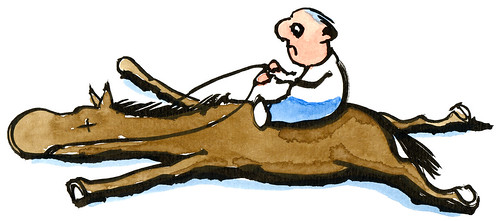The Great British Worker Shortage: Flogging a Dead Horse
The Great British Worker Shortage: Flogging a Dead Horse
Recent headlines bemoan a British workforce apparently lacking motivation as employee shortages plague UK companies. But rather than dusting off the same stale carrot-and-stick strategies aimed at driving disengaged worker horses, a radical shift may be in order. What if leading organisations reinvented their entire mindset and systems to inspire authentic engagement?
Outmoded Assumptions
This seismic reinvention starts with rethinking assumptions:
- Are tired coercion tactics truly the only solution, or are there unmet needs amongst our people?
- Could under-tapped passions and purpose be awakened to fuel commitment?
- What kind of workplace reimagining could kindle individual and collective potential?
Rather than tread the same dead paths, today’s visionary organisations are poised to pioneer reinvention rooted in understanding these human truths. Work can inspire meaning, camaraderie and self-actualisation towering far above merely showing up for a wage. But aspiting to these heights requires a fundamentally fresh lens.
Are we ready to reshape the canvas? What possibilities might emerge through a relationship-based reset? Read on to explore dead-end strategies of the past contrasted to pathways to engagement and symbiotic thriving…
Reinventing the Disengaged British Workforce
Here are 12 strategies often used by companies who find themselves riding a dead horse:
- Change riders: For example, appoint new managers. But rather than simply swap managers, why not build engagement teams to deeply enquire of unmotivated staff on their true passions and purposes?
- Buy a stronger whip: But harsher penalties or coercive measures usually backfire. Could tailored incentives that speak to intrinsic worker values be more sustainably motivating?
- Harness several dead horses together: Attempting to harness disengaged teams rarely breeds vitality. Should clarifying individual purpose come first before teaming to ignite motivation?
- Emulate the best practices of other dead horse riders: Trendy gimmicks gaining traction elsewhere may entertain briefly, but authentic and lasting motivation lives in practices tailored for your people.
- Outsource the ridership: Handing rein over to outsourced managers who lack connection to internal teams can further dissolve rapport and purpose. Regular grassroots engagement from the organisation can rebuild relationships.
- Affirm that “this is the way we have always done things”: Preserving status quo processes may provide familiarity but squelches the innovation and empowerment today’s workforce expects. Could reinvention around the human dimension stir engagement?
- Change the requirements, declaring “This horse is not dead”: When workplace reality conflicts unsustainably with output expectations, organisations able to accept reality and reinvent accordingly tend to thrive.
- Perform cost analysis to see if contractors can ride cheaper: Analysing staff as expenses rather than assets risks missing their fullest potential value. How could we reboot to showcase their upside?
- Promote the dead horse to a management position: Rather than reward fancy titles over real contribution, what if meaningful advancement tied directly to the ability for motivating and uplifting others?
- Sue the horse manufacturer: Playing the blame game often wastes energy better directed toward understanding real needs and reinventing uninspiring systems. What does that reinvention vision entail?
- Claim “the horse was always dead”: Whether motivation issues worsened gradually over time or not, forward-thinking leaders take full responsibility today. Authentic reinvention must start now.
- Hire in foreign riders known for their ability to ride dead horses.
The Antimatter Principle reminds us that inspiration sparked by deeply attending to human emotional needs will always outpace coercion. Will UK companies discover how to truly engage the 21st century British worker by fully reinventing the workplace experience? I boubt it. And yet, The potential awaits fresh thinking!


Instead of focusing entirely on motivations and feelings, how about recognizing that a number of workers do recognize that breathing shared air in poorly ventilated office spaces is a direct threat to their health and life, and that of their loved ones? Like, how much of “a matter of opinion a personal private beliefs” is it when there’s a wide-spread obvious worker shortage, primarily due to workers becoming disabled and/or dying?
And “There’s nothing we can do about it. We’re complying with all the [mostly non-existent] government mandates.” is hardly anything more than a feeble excuse. Along with “We have hand cleaner! We clean surfaces several times a day! Wash your hands!” when the danger is mostly from *airborne* viruses.
How about improved ventilation and air circulation? How about UV-light to directly clean the air? And how about embracing effective tools and processes for remote work? “Compromising” on “X days out of 5 in the office” is a complete failure to even recognize any of the real issues, let alone address any of them.